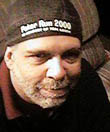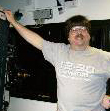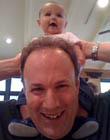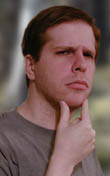|
|
 
|
|
Author
|
Topic: Orthostatic Hypotension
|
|
|
|
|
|
|
|
|
|
|
|
|
Bruce McGee
Phenomenal Film Handler

Posts: 1776
From: Asheville, NC USA... Nowhere in Particular.
Registered: Aug 1999
|
 posted 08-15-2004 09:40 AM
posted 08-15-2004 09:40 AM




Jason, Ol' pal 'O' mine,
Do you know that high blood pressure is also known as 'the silent killer'?
I have low blood pressure. My family is loaded with it. Sometimes, when I stand quickly, I hear a rushing sound in my ears for a moment, and I get dizzy, also for a moment, then I'm OK. Doctors wanted to prescribe drugs to boost my pressure. I declined them. They made me feel goofy. So, here I am, a walking low-pressured time-bomb.
Jason, at least get your blood pressure checked now and then. We'd rather not hear of your passing...
Bruce
| IP: Logged
|
|
|
|
|
|
Darryl Spicer
Film God

Posts: 3250
From: Lexington, KY, USA
Registered: Dec 2000
|
 posted 08-15-2004 11:42 AM
posted 08-15-2004 11:42 AM



What Causes Orthostatic Hypotension?
Blood pressure is maintained by a combination of several things. The heart is the central pump, and a weak or irregular heart can cause orthostasis. Conditions such as arrhythmia, heart failure, deconditioning, and pregnancy are examples where the heart may not be up to the task of providing an adequate blood pressure.
The heart pumps blood, and if there is too little blood volume (anemia, dehydration, dialysis), the pressure drops. The blood vessels in the body also can squeeze (constrict) to raise blood pressure, and if this action is paralyzed, blood pressure may fall. Numerous medications affect blood vessels including most of the medications used for blood pressure, and many of the medications used in psychiatry and for anginal heart pain. Heat, such as a hot shower or from a fever can also dilate blood vessels and cause orthostasis. The nervous system senses and responds to regulate blood pressure. If something is wrong in this control system, blood pressure may fluctuate.
Blood pressure is usually lowered (in persons with orthostasis) by upright posture, food, infection, hyperventilation, hot weather, and lifting of heavy objects. General anesthesia may be unusually dangerous due to blood pressure fluctuations (Bevan et al, 1979).
Vestibular disorders may interact with blood pressure and heart rate control. The vestibular system is one source of information about uprightness (the otoliths), there are some effects of vestibular stimulation on the heart (Radtke, 1992), and there are some patients who have a combination of autonomic and vestibular symptoms.
Neurological disorders can also be caused by orthostasis. This usually takes the form of a TIA precipitated by a blood pressure drop (Brozman et al, 2002).
ORTHOSTATIC HYPOTENSION
| IP: Logged
|
|
|
|
All times are Central (GMT -6:00)
|
|
Powered by Infopop Corporation
UBB.classicTM
6.3.1.2
The Film-Tech Forums are designed for various members related to the cinema industry to express their opinions, viewpoints and testimonials on various products, services and events based upon speculation, personal knowledge and factual information through use, therefore all views represented here allow no liability upon the publishers of this web site and the owners of said views assume no liability for any ill will resulting from these postings. The posts made here are for educational as well as entertainment purposes and as such anyone viewing this portion of the website must accept these views as statements of the author of that opinion
and agrees to release the authors from any and all liability.
|

 Home
Home
 Products
Products
 Store
Store
 Forum
Forum
 Warehouse
Warehouse
 Contact Us
Contact Us




 Printer-friendly view of this topic
Printer-friendly view of this topic













![[Smile]](smile.gif) But my blood pressure always check good -- always. Although, I'm not sure how much of that is due to my heredity or the ability to slow my heart rate at will.
But my blood pressure always check good -- always. Although, I'm not sure how much of that is due to my heredity or the ability to slow my heart rate at will.




